March 4, 2013
by Robin Parker -

World Book Day is just 3 days away. Check out these PrAACtical ideas for celebrating. Just add AAC displays, aided language input, language facilitation strategies, and enthusiasm and World Book Day will be a special celebration. Dia Diversity in Action for 2013 Children’s Book Day- This blog post provides recommendations for a diverse Children’s Book Day (April 30th), but there are some great ideas that can be used for World Book Day. Exploring Children’s Literature through Book Trailers Great blog by K-5 teacher librarian who has been successful using book trailers as a way to connect readers with books. Think of how many learners would be excited and motivated by a video trailer about a book. Caught in the Act of Reading– a photo idea by Pragmatic Mom that we think would be a great classroom or therapy center activity for... [Read More...]
Filed under: PrAACtical Thinking
Tagged With: aided language input, Language facilitation strategies, literacy, World Book Day
March 1, 2013
by Robin Parker -
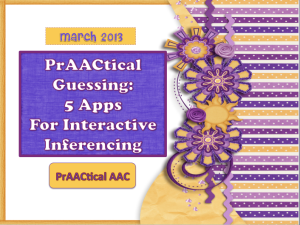
We have been writing and talking about AAC & language strategies that go beyond requesting. And although we start a new month (today) and a new strategy on Saturday, we wanted to close this last day of the work week with a fun way of focusing on a complex but important language skill for ALL learners. If we presume competence, teach, model, and provide activities that are fun and have a variety of response options then everyone can learn to make ‘educated’ guesses and be able to ‘explain’ their choices. There is a difference in making the correct choice and explaining how you made the choice. This skill of guessing is called inferencing. Inferencing is the process by which a conclusion is inferred from an observation or multiple observations. The conclusion may be correct or incorrect, but conclusions are based on information we have at the time. As a language... [Read More...]
Filed under: PrAACtical Thinking
Tagged With: Apps, Inferencing, language
February 28, 2013
by Carole Zangari -
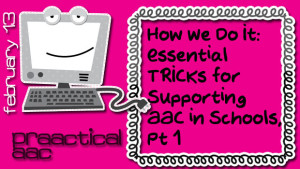
When I first moved to Florida almost 20 years ago, there was a plethora of AAC trainings for special educators, school-based SLPs, and other related service personnel. The AAC professionals in the Orange County area could always be counted on for top-notch information and engaging presentations that kept all of us learning and growing. Florida since moved into a different model for professional development in AT and I am still mourning the loss of access to this fabulous team. We are so lucky that they agreed to share some of their ‘Go – To’ resources with us in this post. The OCPS AT Team has 5 TRICKS to share with us and all of them are very prAACtical. In this post, they share the first two (stay tuned for the other 3 TRICKS in a future post). Get ready to check out their prAACtical ideas and download some of their... [Read More...]
Filed under: PrAACtical Thinking
Tagged With: AAC goals, Boardmaker Share, Cathy George, ELSB, How I Do It, Marcia Piersall, Marcia Sterner, News2you, PCI Reading, Pixon, Story Grammar Marker, Unique Learning
February 27, 2013
by Carole Zangari -
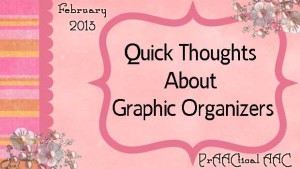
With our love of visually-based communication, it should come as no surprise that we were happy to come across this blog post by Ryan Knobloch. For starters, it’s always gratifying to see examples of how visual supports work for all types of learners in all types of situations. Making language visible is a good thing for all of us. Graphic organizers are one way to add clarity in AAC therapy sessions. It got us to thinking about how to make them accessible to learners with AAC needs by scanning them and making them into forms, for example. We also started reflecting on what goals could be supported through the use of this strategy. Semantic development and building stronger narrative skills immediately came to mind. Do you use graphic organizers in your work with AAC learners? We’d love to hear about it.
Filed under: PrAACtical Thinking
Tagged With: accessibility, Graphic Organizers
February 26, 2013
by Robin Parker -
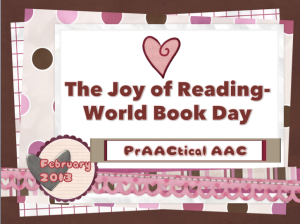
Get ready for World Book Day ! Help spread the love of all things about reading. This is a day about the joy of reading more than the instructional aspects of reading. We are sure everyone has their own ideas about the fun in reading but we picture comfortable spaces, favorite books, favorite authors, and special times reading with someone special or even alone. World Book Day is all about books, authors, illustrators, and of course reading . The idea is to celebrate reading and all that reading has to offer. March 7, 2013 is the 16th annual World Book Day. Check out all of the resources, contests, and books available on the official World Book Day website. With the thought of reading as a celebration, here are some great resources for ALL readers 50 Fabulous, Fun, Ideas to Encourage a Love of Reading for World Book Day & Every Day of the Year by NutureStore... [Read More...]
Filed under: PrAACtical Thinking
Tagged With: literacy, resources
February 25, 2013
by Carole Zangari -
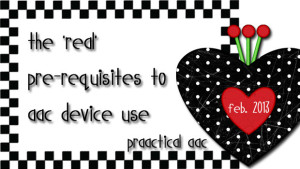
How long did you practice your driving skills before you took your driver’s license road test? A week? A month? A couple of months? We love videos like this one that show kids in the process of developing skills with technology. It’s not usually a quick and easy process, but if we prepare ourselves and the families with whom we work for the process, good things will happen. Little Eva and her family remind us that kids don’t have to ‘prove’ readiness for high tech AAC. They deserve opportunities to use these tools to learn, develop, and grow. The next time that people tell you that one of your clients with complex communication needs ‘isn’t ready’ for AAC technology, you might want to ask them how things might have gone if they had taken the road test a few days after their first time behind the wheel. We needed practice.... [Read More...]
Filed under: PrAACtical Thinking
Tagged With: eye gaze, pre-requisites, Rett, SGD
February 22, 2013
by Carole Zangari -
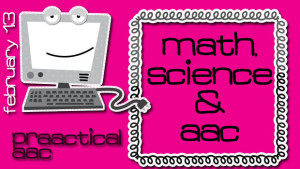
In an earlier post, we began sharing content on AAC and inclusion based on articles from ASHA’s Special Interest Group (SIG) quarterly publication, Perspectives on AAC. Although the final versions are available only to SIG members, clearance has been given to post the original articles. Today, we are pleased to share the work of Michele Boruta and Kara Bidstrup. In this article, they discuss a process for using standards‐based math and science curricula to build the linguistic competence of students who use AAC. In the US, there is an increasing focus on using the curriculum as the launching point for all IEP-driven intervention. Though the mandate for using curricula as the context for therapies is not new, many SLPs are still getting comfortable with this approach. We hope this article provides some prAACtical guidance for therapists who are striving to integrate AAC teaching with curriculum content. Thank you to Ms.... [Read More...]
Filed under: PrAACtical Thinking
Tagged With: ASHA, CCSS, common core state standards, goals, Kara Bidstrup, math, Michele Boruta, science
February 21, 2013
by Carole Zangari -
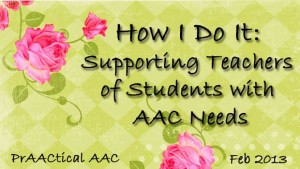
We couldn’t be happier to have a guest post by Jane Farrall for our How I Do It series. Jane has worked as a school and adult service based speech pathologist and literacy teacher. She has also worked as an assistive technology specialist and is currently working as an independent consultant in literacy, AAC and Assistive Technology. Jane has been working in the disability and assistive technology field for over 20 years. She has extensive practical experience in both AAC and in teaching children and adults with disabilities to acquire literacy. She has completed a Masters in Special Education focusing on literacy acquisition in children and adults without speech. Jane is a former Chairperson of AGOSCI (Australian Group on Severe Communication Impairment) and is the founder and organiser of the Big Mouth Camp, a camp for school aged students using speech generating devices and their families. You can get more... [Read More...]
Filed under: PrAACtical Thinking
Tagged With: consultation, educators, How I Do It, Jane Farrall, teachers
February 20, 2013
by Carole Zangari -
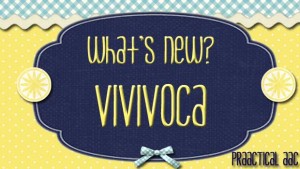
It’s always exciting when we see new ideas take shape in AAC tools. Take a look at the research on VIVIVOCA: voice-input, voice-output communication aid. This holds much promise for clients who have poor speech intelligibility but good consistency in their error patterns, such as people with dysarthria secondary to cerebral palsy. Here’s the article. Thanks to the indefatigable Ian Bean for alerting us to this article. Hawley, M.S., Cunningham, S.P., Green, P.D., Enderby, P., Palmer, R., Sehgal, S., & O’Neill, P. (2013). A voice-input voice-output communication aid for people with severe speech impairment. IEEE Transactions on Neural Systems and Rehabilitation Engineering, 21, 1, 23-31.
Filed under: PrAACtical Thinking
Tagged With: article, journal article, research, SGD, speech recognition
February 19, 2013
by Robin Parker -
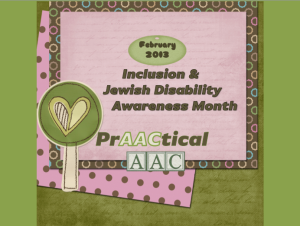
February 2013 is the 5th annual Jewish Disability Awareness Month. In honor of inclusion into a Jewish education and life we wanted to share some resources that will help support full participation for everyone. Keep in mind though, the idea of inclusion transcends a specific religion and all of the resources here can customized and used to welcome ALL families. A Virtual Book Club Webinar: Now I See The Moon- A Mother, A Son, A Miracle **Definitely Worth Watching (great story and learn how inclusive programming was created where there was none)** Jewish Disability Awareness Facebook Page Gateway Access to Jewish Education Visual Supports for Passover, Shabbat, High Holidays, Chanukah, & Purim. Jewish Disability Awareness Month Guide Children’s Book’s About Disability
Filed under: PrAACtical Thinking
Tagged With: Books, Disability Awareness, inclusion, visual supports









